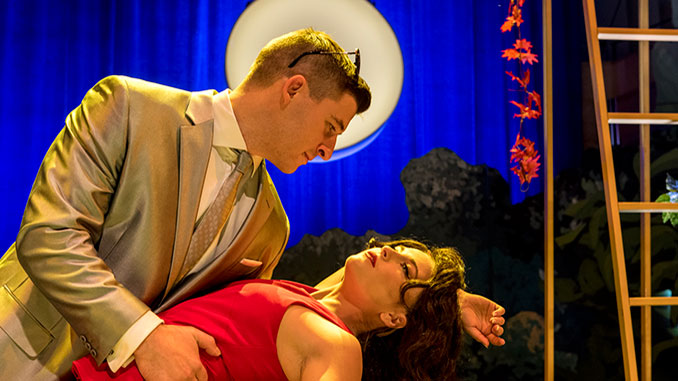 One of the great beauties of opera is its ability to instantaneously manipulate our emotions by what it conveys in music and text.
One of the great beauties of opera is its ability to instantaneously manipulate our emotions by what it conveys in music and text.
On Thursday evening, that quality abounded in Pinchgut Opera’s first fully staged production since 2019, Francesco Cavalli’s Gli amori d’Apollo e di Dafne – or as its English translation advertises it, The Loves of Apollo & Dafne.
A pupil of Claudio Monteverdi, Cavalli reigned throughout the 17th century as one of opera’s greatest exponents, composing over 30 works which almost all premiered at one of the newly established public theatres in Venice, the Teatro Cassiano. Despite Cavalli’s recognition today, it is still rare to see his works on the stage.
Pinchgut Opera are changing that. In this, its 20th anniversary year, the company is featuring its third Cavalli work. Beginning with Ormindo in 2009, then Giasone in 2013, The Loves of Apollo & Dafne is the composer’s second opera, written to a fabulously timeless libretto by Giovanni Francesco Busenello.
Artistic Director Erin Helyard has unearthed a watertight gem and reveals Cavalli’s undulating, melodically mood-changing music and informative vocal lines superbly, under his embracing command of the small but exceptional nine-member Orchestra of the Antipodes.
Without director Mitchell Butel’s adorably eccentric vision, however, its theatrical potential may never have been known. It is as if Butel has turned Cavalli’s opera upside down and blown it to pieces, giving it imaginative new life and something to say almost 400 years later.
The colours are electric and so are the voices in Butel’s riotous and witty romp in the park which highlights and toys with Busenello’s libretto. With over 20 roles cast for 6 principal singers in multiple guises and a chorus of four, an ancient Greek myth is revitalised and resonates splendidly.
For its enlightening schooling on love, Jeremy Allen’s set, Melanie Liertz’s costumes and Damien Cooper’s lighting all combine to seemingly take the audience back to childhood, to a land of cardboard cut-out vibrancy teeming with larger than life characters in a pantomime of sorts.
The god Apollo (Max Riebl as a yoga instructor and a bit of a twat), is in fruitless pursuit of Dafne (Alexandra Oomens as a pert, headstrong gardener) in Homer’s Thessaly, here a small park in which, amongst so many other comings and goings, a chorus of four sunflower-faced muses sing radiantly in Dafne’s support.
At this point you wouldn’t be surprised if Bill and Ben the flower pot men showed up. But Dafne vows to stay single and won’t have a bar of Apollo. With the help of her father, Peneo the river god (Andrew O’Connor as a plumber), her life is given a tree-change, as opposed to actually being turned into a laurel tree.
Cupid (Stacey Alleaume as a skateboarding punk) takes revenge on Apollo. Aurora (Oomens again, as a curvaceous minx) is having an affair with Cefalo (Riebl again, now as a shiny-suited slime bucket) but Cefalo’s wife Procris (Alleaume again, as a pram-pushing mum) witnesses the affair.
There’s the god of sleep, Sonno (David Hidden as a kaftan clad guru), who promises fabulous dreams from the start, Filena (Jacqueline Dark as a leisure-suited dog-walker), who advises Dafne to hook up with Apollo while she’s young, but is more than willing to bonk him if he had any interest in her, as well as numerous other characters in the park.
Sounding confusing? And bonkers? In fact, Butel makes it awesomely clear, often hilarious and vitally poignant, just as Cavalli’s music instructs it. Riebl, Oomens and Alleaume carry the bulk of the singing, juggling their multiple roles with absolute conviction and outstanding animated flexibility.
Riebl’s striking countertenor is in winning gymnastic form. Oomens’ crystalline soprano radiates with penetrating appeal as she floats her notes nimbly across her music and making her twin roles so uniquely different, it is hard to believe it is the same person.
The contrast set up between Oomens‘ Aurora being enamoured by Cefalo and Dafne being repulsed by Apollo seems a wonderful marker of what we chose and what could be.
Alleaume’s luxurious soprano is a treasure to hear, taking out Act 1’s finale before interval with a formidable and crushingly tragic lament when Procris continues to declare her love for Cefalo despite being cheated on.
Mezzo-soprano Jacqueline Dark defines each of her four characters with strong acting and sings a spectrum of exciting colours, Hidden shares his charismatic bass generously and bass-baritone Andrew O’Connor, among his three roles, sings a stunner of an aria in the final Act as Peneo gives up his daughter Dafne to nature.
The ensemble is also enhanced greatly by the talents of young artists Claudia Mackay. Olivia Payne, Elias Wilson and Andrew Taylor Knight as the sunflower muses, yoga class participants and more. At the end of the day, The Loves of Apollo & Dafne might very well be saying love is a confusing affair us mortals are at the mercy of.
If not that, there will be plenty opportunity to decide for yourself since it is being recorded for broadcast on ABC Classic and filmed by Australian Theatre Live for cinematic and digital release.
If you can’t attend a performance, I highly recommend tuning into its many wonderful ingredients.
The Loves of Apollo & Dafne
City Recital Hall, 2 Angel Place, Sydney
Performance: Thursday 20 May 2021
Season continues to 26 May 2021
Bookings: www.opera.org.au
For more information, visit: www.pinchgutopera.com.au for details.
Image: Max Riebl as Cephalo and Alexandra Oomens as Aurora – photo by Brett Boardman
Review: Paul Selar
